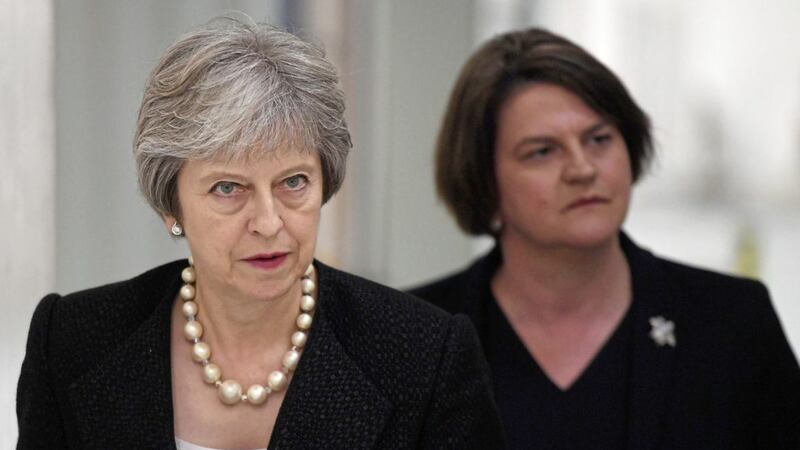Rethink your dismissal of the deal, say business and farming reps, for the first time openly contradicting unionist political leadership.
Re-thinking to unionism equals selling-out, as was true of nationalism until John Hume lifted its cause out of the narrow north, made friends and influenced people by preaching that sharing was good for all.
Karen Bradley, timid while on DUP-pleasing duty, is galvanised to defend her patron Theresa May and gangs up with a business world that has found its voice. The DUP, puffed up with the power of chance, shrinks back into the frozen stance of siege, the paranoia of ‘betrayal’. Meanwhile Europhobes and showboaters run amok in Westminster, perhaps misled by conceit and ideology. The path ahead for May is jagged, but she has more chance of survival than there is of the DUP on present form showing leaderly courage.
It goes against the grain to praise a British politician who ignores the fact that there are two political identities in the part of her ‘precious union’ that the DUP maintain they represent. The May specialism twins grit with wrong-headedness. EU negotiators are now trying where they can to fill out the ‘political declaration’ that accompanies the ‘withdrawal document’, with phrases that might sound softer without changing the drift. Then if agreed by next weekend both documents go into years of further negotiation, dotting i’s and crossing t’s. But May is at last telling the truth; that there is no better deal to be had, that nobody else will do better.
Is this leadership? Professing to negotiate while playing to people who brook no negotiation was never going to work, although the Conservative party May took over from David Cameron, its anti-EU extremists beyond reason, may be unleadable. There was never going to be a deal that improved on the UK’s position inside the EU. It was always going to snarl up on the border. May did her own deal with the DUP and then discovered the border was their frontier, blood-red line, symbol of their singular Britishness. As for the Republic as an EU player in good standing, neither she nor most of the British political class knew that either.
But she is lucky in her rivals. Dominic Raab had his little go at the weekend, his childish pitch that hybrid customs union/ single market backstop was inserted he knew not by whom. On mature reflection he could not defend it.
And he would be the leader? Andrea Leadsom is said to be coordinating a group which will offer a plan for re-negotiation. This is the woman who thought she could beat May at the last contest by reminding everyone that she has children and May does not.
If her group develops an existence Michael Gove would be its brains, though still fresh in most memories is Gove’s sabotage of the leadership bid by his own closest ally Boris Johnson. On Gove’s turnaround last week, from being willing to resign from the cabinet and challenge May, to staying put to support her, the best comment came from Jeremy Corbyn’s deputy Tom Watson. No slouch himself at undercutting his leader, Watson said Gove was the only politician he knew ‘who makes not resigning sound like an act of disloyalty’.
A dismayed Nigel Dodds grasped at the support he heard in the Commons from anti-deal Brexiteers. Anything rather than focusing on his party’s sorry state, identification with business and farming suddenly rent in public, influence in Downing Street exposed as irrelevant, much like nominal leader Arlene Foster. A displeased Foster, says the Irish Times, has told Chamber of Commerce members in private that they misread the deal. Do business leaders do eye-rolls?
The DUP lined up to Leave, probably expecting a Remain win but desperate to be British like Britons, pathetically pleased to have May dependent on them. Sir Jeffrey the chief whip, ignored by Chief Brexiteer Sammy, has never seemed quite as full of it as Arlene on her day trips to London, Nigel the Commons point-man. But then young Jeff’s first political job was as NI guide to Ulster Unionism’s big catch Enoch Powell. Already finished in Britain, Enoch was still a star to UU leader Jim Molyneaux, who believed Thatcher’s admiration for integrationist Powell would stop her doing deals with the Irish. Then she signed the Anglo-Irish Agreement, 33 years ago last Thursday.
Business ‘leaders’ said nothing useful in public then. If they have found a voice at last and stick to it, better late than never.








